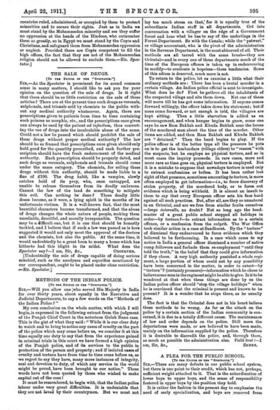METHODS OF THE INDIAN POLICE.
[To THE EDITOR OP THE "SPECTATOR."] SIRS Will you allow one ',who served His Majesty in India for over thirty years, about equally in the Executive and Judicial Departments, to say a few words on the "Methods of the Indian Police ? "
My own conclusion on the whole matter, with which I will begin, is expressed in the following extract from the judgment of the Punjab Chief Court in the notorious Gulab Bann case. This is the gist of what they said : " While it is our clear duty to watch and to bring to notice any cases of cruelty on the part of the police which may come before us, we consider it at this time equally our duty to say that from the experience gained in criminal trials in this court we have formed a high opinion of the Punjab police, and of its services to the public in protection of the person and property ; and if isolated cases of cruelty and torture have from time to time come before us, as we regret to say they have, many more instances of integrity, zeal and devotion to duty, of which any service in the world might be proud, have been brought to our notice." Those words have not been quoted by those who wished to make capital out of the case !
It must be remembered, to begin with, that the Indian police labour under very great difficulties. It is undeniable that they are not loved by their countrymen. But we must not lay too much stress on that,' for it is equally true of the subordinate Indian staff in all departments. Get into conversation with a villager on the edge of a Government forest and hear what he has to say of the underlings in the Forest Department. So with the Canals; while the " patwari," or village accountant, who is the pivot of the administration in the Revenue Department, is the most abhorred of all. Their methods are all tarred with the same brush—they are Oriental—and in every one of these departments much of the time of the European officers is taken up in endeavouring to modify—to eradicate is hopeless—these tendencies. Some of this odium is deserved, much more is not.
To return to the police, let us examine a little what their ordinary methods are : There has been a brutal murder in a certain village. An Indian police official is sent to investigate. What does he do P First he gathers all the inhabitants of the suspected village and sits them down. Not one of these will move till be has got some information. If anyone comes forward willingly, the officer takes down his statement ; but if none come forward, or not enough is told, the villagers are kept sitting. Then a little starvation is added as an encouragement, and when hunger begins to gnaw, some one says he saw Ram Bakhsh and Khnda Bakhsh near the house of the murdered man about the time of the murder. Other items are added, and then Ram Bakhsh and Khuda Bakhsh are " detained." Then the band begins to play. If the police officer is of the better type all the pressure be puts on is to get the lambardars (village elders) to " reason" with the suspects, but he employs no physical torture, and so in most cases the inquiry proceeds. In rare cases, more and more rare as time goes on, physical torture is employed. But it is a mistake to suppose that nowadays torture is used only to extract confessions or bribes. It has been rather lost sight of that pressure, sometimes amounting to torture, is more often employed to get information—i.e., to force discovery of stolen property, of the murdered body, or to force out evidence which is being withheld. It is almost an insult to them to say that every European officer sets his face hard against all such practices. But, after all, are they so unnatural in an Oriental, and are we free from similar faults ourselves —longo intervallo, no doubt P Not so long ago the head- master of a great public school stopped all holidays in order—by torture P—to extract information as to a certain offence, or a confession from the culprit. The War Office took similar action in a case at Sandhurst. By the "torture" of dismissal they endeavoured to force evidence which they believed to be forthcoming. In a case which came to my notice in India a general officer dismissed a number of native camp followers and forbade them re-employment "until they told the truth," in the belief that they could give information if they chose. A very high authority punished a whole regi- ment, a large portion of whom could not by any possibility
have been concerned in the matter, in order to extort—by "torture"? (certainly pressure)—information which he chose to
believe some men in the regiment might be able to give. Is it to be
wondered at that when these things are done by us the Indian police officer should "stop the village holidays " when
he is convinced that the criminal is present and known to be present P It is a wonder that he stops there, as he usually does.
The fact is that the Oriental does not in his heart believe these methods to be wrong. As far as the attack on the police by a certain section of the Indian community is con- cerned, it is due to a totally different cause. The maintenance of law and order depends on the police. Still more the
deportations were made, or are believed to have been made, mainly on the information supplied by the police. Therefore it is desirable to discredit the police, and, through them, as much as possible the administration also. Voila. tout !—I






































 Previous page
Previous page